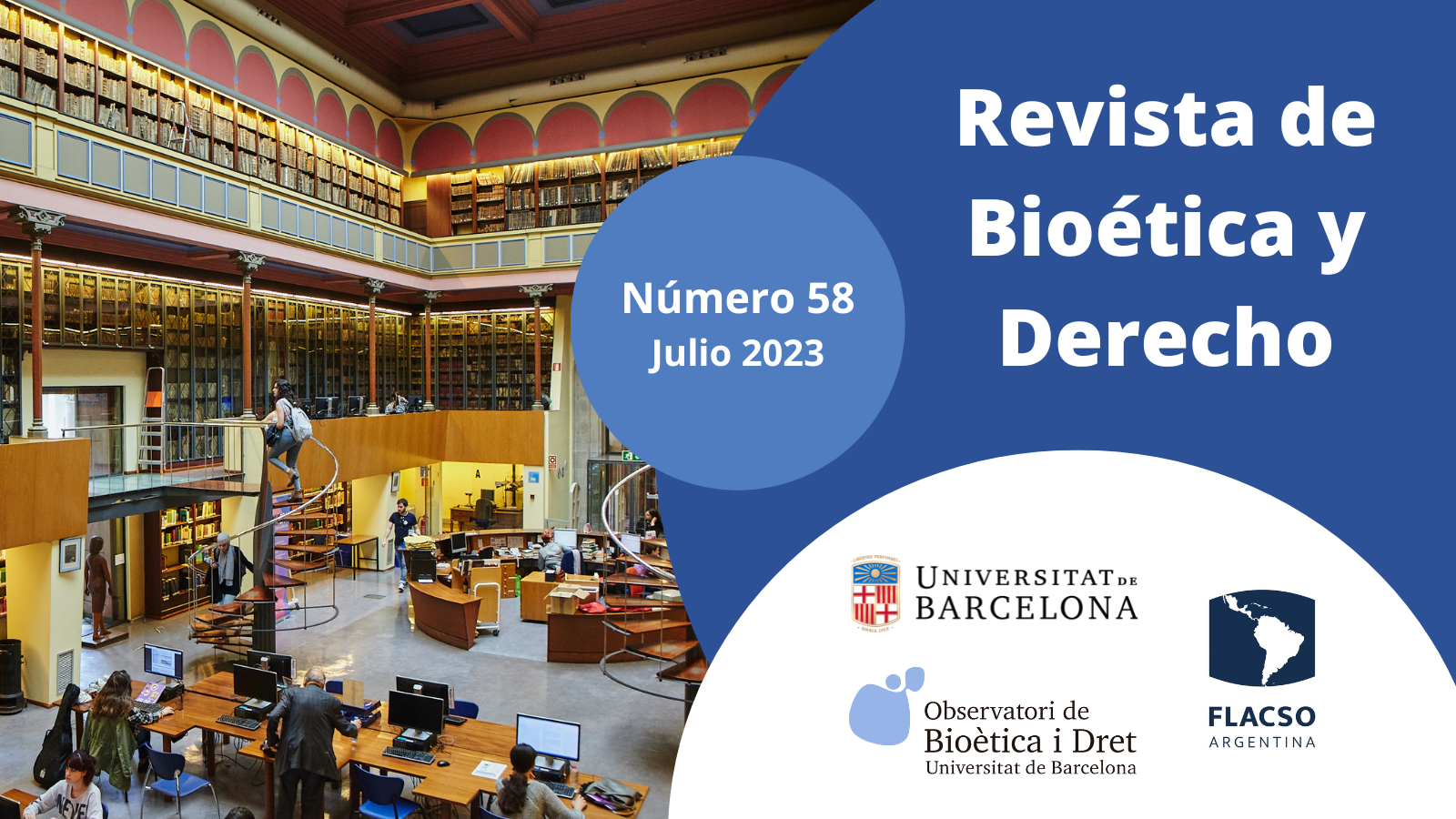Bioethics in pluricultural contexts: Epistemological problems and their relationship with Human Rights
DOI:
https://doi.org/10.1344/rbd2023.58.39782Keywords:
Bioethics, Epistemology, Pluriculturality, Human Rights.Abstract
The objective of the research is to identify the epistemological problems that arise in the knowledge and praxis of Bioethics in pluricultural and multiethnic contexts such as the Sierra Sur of Oaxaca, Mexico, and to determine their relationship with human rights, specifically with the Human Rights Based Health Approach (HRBA). The method is the pragmatic epistemological realism of Jürgen Habermas. The results show two types of problems: the first is the type of subject-object relationship of knowledge in which the Other is subjectivized as an object and instrumentalized; and the second is the methodological reductionism and therefore the forms of verification of true propositions. As far as human rights linked to epistemological problems are concerned, they are mainly collective and secondarily individual, while the process of knowledge is a social, communal and historical phenomenon. We conclude that pluriculturality is a phenomenon that complexifies and enriches the work of Bioethics with a multiple reality of sensitive, intelligible and valuative type, this nexus shows the need to develop inter or transdisciplinary approaches that lessen both epistemological problems and the incidence in the violation of human rights.
References
Barreda, A. (2001). Biopiratería y resistencia en México. El Cotidiano; 18(110), pp. 21-39.
Belausteguigoitia Rius, M. (2001). Descarados y deslenguadas: el cuerpo y la lengua india en los umbrales de la nación. Debate Feminista; 24. https://doi.org/https://doi.org/10.22201/cieg.2594066xe.2001.24.668.
Botbol-Baum, M. (2015). Epistemology of bioethics in the making: from historical context to conceptual plurality and anticipation. Bioethics Update; 2 (79), pp. 79-95. Doi: 10.1016/j.bioet.2015.12.002.
Bunge, M. (2004). Emergencia y convergencia. Novedad cualitativa y unidad de conocimiento. Barcelona: Ed. Gedisa.
Crowther H, Lipworth W, Kerridge I. J. (2011). Evidence-based medicine and epistemological imperialism: narrowing the divide between evidence and illness. Journal of Evaluation in Clinical Practice; 17(5), pp. 868-872. Doi: 10.1111/j.1365-2753.2011.01723.x.
Diaz F. Robles Hernandez, S. Cardoso Jimenez R. (2007). Escrito: comunalidad, energía viva del pensamiento mixe = Ayuujktsënää'yën - ayuujkwënmää'ny - ayuujk mëk'äjtën. México: Universidad Nacional Autónoma de México.
Djulbegovic B, Guyatt GH, Ashcroft RE. (2009). Epistemologic inquiries in evidence-based medicine. Cancer Control; 16(2), pp. 158-68. Doi: 10.1177/107327480901600208.
Fricker, Miranda (2017). Injusticia epistémica (Ricardo García Pérez, Trad.). Barcelona, CT: Herder.
García Santos L, Ruiz Martínez A y Castillo Leal M. (2018). Ecoturismo y gestión de la biodiversidad en Santa Maria Ixtepeji y Calpulálpam de Méndez, Oaxaca. En: Impacto socio-ambiental, territorios sostenibles y desarrollo regional desde el turismo. Universidad Nacional Autónoma de México y Asociación Mexicana de Ciencias para el Desarrollo Regional A.C. México, Ed. UNAM.
Garrafa V, Azambuja L. (2009). Epistemología de la Bioética: enfoque Latino-Americano. Revista Colombiana de Bioética; 4 (73), p.73-92.
Gobiernos de Oaxaca. Atlas del Instituto Nacional de los Pueblos Indígenas. Disponible en: http://atlas.inpi.gob.mx/oaxaca-2/.
Habermas J. (2002). Verdad y justificación. Trotta. Madrid, 2002.
INEGI (2015). Panorama sociodemográfico de Oaxaca https://www.inegi.org.mx/contenido/productos/prod_serv/contenidos/espanol/bvinegi/productos/nueva_estruc/inter_censal/panorama/702825082307.pdf.
INEGI (2020). Censo de población y vivienda https://censo2020.mx/.
ISIA Instituto Superior Intercultural Ayuuk (2022). https://www.isia.edu.mx.
Jacorzynski Witold R. (2016). Del salvaje exótico al Otro cultural: conflictos éticos en la antropología. México: Ed. CIESAS.
Jacorzynski Witold R. (2000). En busca del paraíso perdido: el "Otro" en la mirada desde Chiapas. Estudios Sociológicos; 18(52), pp. 85-124. Disponible en: http://www.jstor.org/stable/40420606.
Lebrato MJ. (2016). Diversidad epistemológica y praxis indígena en la educación superior intercultural en México: un caso de estudio en el Instituto Superior Intercultural Ayuuk. Revista Mexicana de Investigación Educativa; 21(70), pp.785-807.
Maldonado Alvarado B. (2016). Hacia un país plural: educación comunitaria en Oaxaca frente a la política de interculturalidad cero. LiminaR; 14(1), pp. 47-59.
Maldonado Alvarado B; Maldonado Ramírez CL. (2018). Educación e interculturalidad en Oaxaca: avances y desafíos. Sinéctica; (50), pp. 1-17. Doi: 10.31391/s2007-7033(2018)0050-006.
Martínez Luna, J. (2009). Eso que llaman comunalidad. Oaxaca, México: Culturas Populares, CONACULTA/Secretaría de Cultura, Gobierno de Oaxaca/Fundación Alfredo Harp Helú Oaxaca, AC.
Organización Mundial de la Salud. Enfoque de salud basado en los derechos humanos. Bol. 2010.
Quintanas, A. (2009). Reseña de Bioethics: Bridge to the Future de Van Rensselaer Potter. Sinéctica Revista Electrónica de Educación; (32), pp. 1-5.
Roa-Castellanos R, Bauer C. (2009). Traducción de los Textos Sobre el Imperativo Bioético y la Biopsicología de Fritz Jahr. Revista Latinoamericana de Bioética; 9(2), pp. 92-105. Doi: 10.18359/rlbi.1063.
Robertt P, Lisdero P. (2016). Epistemología y metodología de la investigación sociológica: reflexiones críticas de nuestras prácticas de investigación. Sociologías; 18(41), pp. 54-83. Doi: 10.1590/15174522-018004103.
Roqué-Sánchez M, Corcó-Juviñá J. (2013). El estatuto epistemológico de la Bioética. Cuadernos de Bioética; 24(3), p.463-474.
Yamin AE, Frisancho A. (2015). Human-rights-based approaches to health in Latin America. Lancet; 4385(9975), pp. e26-9. Doi: 10.1016/S0140-6736(14)61280-0.
Von Thaden Ugalde HA, Robles C, Fuente Carrasco ME. (2020). La actividad minera del siglo XX en el Valle de Oaxaca: Riesgos de Salud Pública de hoy. Revista internacional de contaminación ambiental; 36(1), pp.165-175. Doi: 10.20937/RICA.2020.36.53209.
Downloads
Published
How to Cite
Issue
Section
License
Copyright (c) 2023 Roxana Nayeli Guerrero Sotelo, José Eduardo Orellena Centeno, Melecio Honorio Juárez Pérez, Sergio Alberto Ramírez García

This work is licensed under a Creative Commons Attribution-NonCommercial-NoDerivatives 4.0 International License.
 The author retains the copyright and grants Revista de Bioética y Derecho the right of first publication of the article. All articles published in Revista de Bioética y Derecho are under Creative Commons licensing Recognition – Non Commercial – NoDerivedArtwork (by-nc-nd 4.0), which allows sharing the content with third parties, provided that they acknowledge its authorship, initial publication in this journal and the terms of the license. No commercial use of the original work or generation of derivative works is permitted.
The author retains the copyright and grants Revista de Bioética y Derecho the right of first publication of the article. All articles published in Revista de Bioética y Derecho are under Creative Commons licensing Recognition – Non Commercial – NoDerivedArtwork (by-nc-nd 4.0), which allows sharing the content with third parties, provided that they acknowledge its authorship, initial publication in this journal and the terms of the license. No commercial use of the original work or generation of derivative works is permitted.







